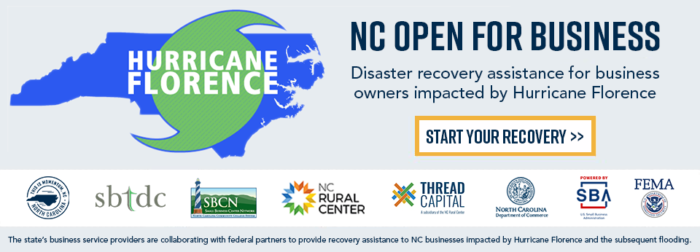The Economic Development Partnership of North Carolina (EDPNC) is one of several leading industry-support organizations that have banded together to take calls and provide assistance to small- to mid-size businesses needing immediate help in recovering from the devastation of Hurricane Florence.
Collaboration is critical to providing a more streamlined and efficient recovery response to help businesses and communities get up and running, according to the U.S. Small Business Administration (SBA), a federal partner in this recovery effort.
 “The U.S. Small Business Administration is strongly committed to providing North Carolina residents with the most effective response possible to assist businesses, homeowners and renters with federal disaster loans,” SBA Administrator Linda McMahon said.
“The U.S. Small Business Administration is strongly committed to providing North Carolina residents with the most effective response possible to assist businesses, homeowners and renters with federal disaster loans,” SBA Administrator Linda McMahon said.
The SBA, operating out of the NC Rural Center in Raleigh, is deploying its reservists to affected areas to help accept SBA loan applications.
Businesses may face months, or even years, of financial and physical setbacks in the aftermath of Florence. Beyond immediate physical damage, they may have to navigate lost revenues, staff shortages, road closures and economic downturns within their local communities.
“I have had to eat nearly 50 percent of the costs of running my business since the storm hit,” said Ryan Gibbs, owner of Gibbs Management Services in Wilmington, North Carolina. His small business contracts with local municipalities and nonprofits to provide meals for their local Meals On Wheels programs.
“In order to continue to serve those in need, I needed access to cash flow quickly,” Gibbs said. So Gibbs turned to the NC Rural Center, a partner in the collaborative effort to help hurricane-impacted businesses, and its Thread Capital subsidiary, which is offering zero-interest expedited loans to support businesses as they await SBA disaster-recovery loans or insurance payouts.
“Since many local businesses are still closed, including my local bank, I quickly ran through much of my business’s credit,” Gibbs said. “Within minutes of contacting Thread Capital, I was already in touch with someone who helped me through the loan process.”
Partners in the response offer services including help with developing post-storm recovery strategies, access to short-term capital to support immediate cleanup costs and cover lost revenue, and longer-term programs to repair physical damage and recover from more significant economic losses.
Here are the steps affected business owners can take to get help:
- Call 1-800-228-8443 to reach a business counselor at Business Link North Carolina, the small business support arm of the EDPNC, or visit www.sbtdc.org/hurricaneflorence and submit a “business recovery intake form.” Staff will help you find a local counselor with the North Carolina’s Small Business and Technology Development Center (SBTDC) or the community college’s Small Business Center Network. Business counselors experienced in disaster recovery can assess your business impacts, provide an overall recovery plan and help you navigate the application process for rapid recovery or SBA disaster loans.
- Contact your insurance carrier to file your claim.
- Register with the Federal Emergency Management Agency online at DisasterAssistance.gov or download the FEMA mobile app. If online or mobile access is unavailable, applicants should call the FEMA toll-free helpline at 1-800-621-3362. (TTY: 1-800-462-7585).
- Consider applying for a Hurricane Florence Rapid Recovery Loan. Thread Capital offers expedited bridge loans for up to $50,000 at zero interest for six months.
- SBA disaster loans are an affordable option for those affected by Hurricane Florence. SBA provides low-interest disaster loans to businesses, nonprofit organizations, homeowners and renters. Physical damage and economic injury loans of up to $2 million cover uninsured or underinsured losses and help meet financial obligations.
North Carolina’s hurricane-related collaboration of federal, state, and nonprofit partners has created NC Open for Business, a one-stop website at www. sbtdc.org/hurricaneflorence/ to more efficiently assist the state’s business owners in their disaster recovery efforts. Businesses affected by the hurricane can find a step-by-step guide on what to do once the storm has passed and the waters have receded. Resources are updated daily.
Partner organizations include: North Carolina’s SBTDC, NC Rural Center and its subsidiary Thread Capital, North Carolina Small Business Center Network, the EDPNC and its Business Link North Carolina division, the North Carolina Department of Commerce, the SBA and FEMA.

